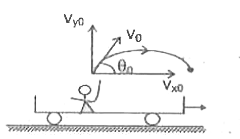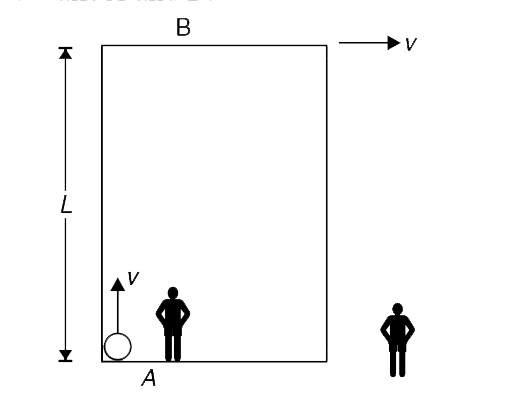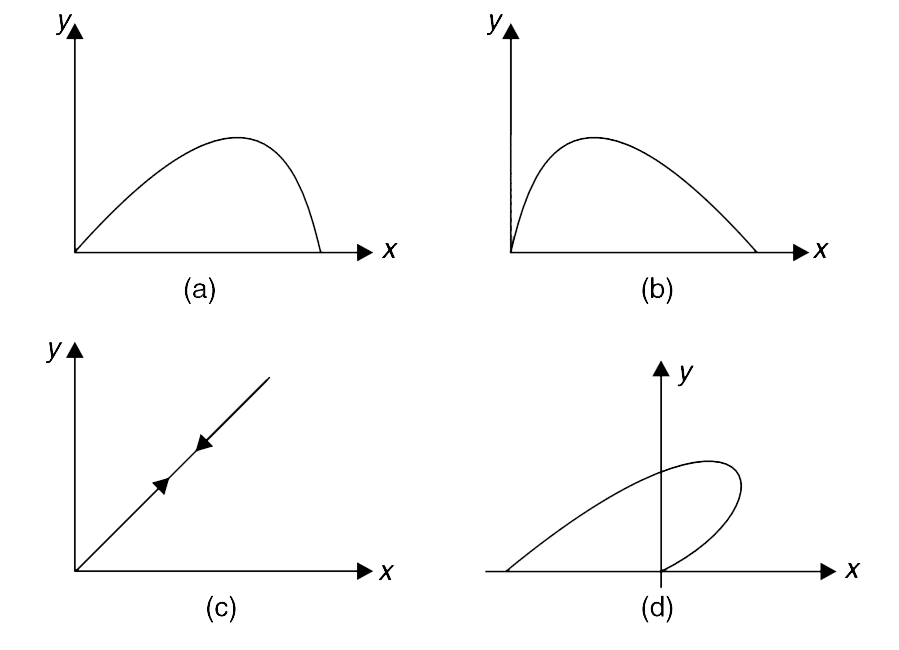A boy travelling in an open car moving on a levelled road with constant speed tosses a ball vetically up in the air and catches it back. Shetch the motion of the ball as observed by a boy stanceing on the footpath. Give explanation to support your diagram.
The path of the ball observed by a boy standing on the footpath is parabolic. The horizontal speed of the ball is same as that of the car, therefore, ball as well car travells equal horizontal distance. Due to its vertical speed, the ball follows a parabolic path.

Topper's Solved these Questions
Similar Questions
A boy throws a ball in air at 60∘ to the horizontal along a road with a speed of 10m/s (km //h). Another boy sitting in a passing by car observes the ball. Sketch the motion of the ball as observed by the boy in the car, If car has a speed of (18 km //h). Give ezplanation to support your diagravm.
View SolutionA boy throws a ball up and catches it when the ball falls back. In which part of the motion is the ball decelerating ?
View Solution
Knowledge Check
- Question 1 - Select One
A person sitting in an open car moving at constant velocity throws a ball vertically up into air. The ball falls
AOutside the carBIn the car ahead of the personCIn the car to the side of the personDExactly in the hand which threw it up - Question 2 - Select One
A boy is sitting in a car moving with uniform velocity. The boy throws a ball vertically upwards which falls back into his hands. A man standing on the road watches the motion of the ball. The path of the motion of the ball will be:
Aa straight line for the manBa straight line for the boyCa parabola for the manDa parabola for the boy - Question 3 - Select One
A bus moves over a straight level road with a constant acceleration a. A boy in the bus drops a ball out side. The acceleration of the ball w.r.t the bus and the earth are respectively
A√a2+g2,gBg,√a2+g2Ca,gDg,a
A boy is standing inside a train moving with a constant velocity of magnitude 10 m/s. He throws a ball vertically up with a speed 5 m/s relative to the train. Find the radius of curvature of the path of the L ball just at the time of projection.
 View Solution
View SolutionA man standing inside a room of length L rolls a ball along the floor at time t=0. The ball travels at constant speed v relative to the floor, hits the front wall (B) and rebounds back with same speed v. The man catches the ball back at the wall A at time t0. The ball travelled along a straight line relative to the man inside the room. Another observer standing outside the room found that the entire room was travelling horizontally at constant velocity v in a direction parallel to the two walls A and B.

(a) Find the average speed of the ball in the time interval t=0 to t=t0 as observed by the observer outside the room.
(b) If the room has acceleration in the direction of its velocity draw a sketch of the path of the ball as observed by the observer standing outside. Assume that velocity of room was v at the instant the ball was released.View SolutionA base ball player has a nightmare. He is accidentally locked in a railroad boxcar. Fortunately, he has his ball and bat along. To start the car moving, he stands at one end bats the ball towards the other end. The impulse exerted by the ball as it hits the end wall, gives the car a forward motion. Sice the ball always rebounds and rolls along the floor back to him, the player repeats this process over and over. Eventually the car attains a very high speed, and the player is killed as the boxcar collides with another car sitting at rest on the track. Analyze this dream and the physics concepts involved in it.
View SolutionA ball is projected in vertical x–y plane from a car moving along horizontal x direction. The car is speeding up with constant acceleration. Which one of the following trajectory of the ball is not possible in the reference frame attached to the car? Give reason for your answer. Explain the condition in which other trajectories are possible. Consider origin at the point of projection.
 View Solution
View SolutionA car A is travelling on a straight level road with a uniform speed of 60 km/h. It is followed by another car B which in moving with a speed of 70 km/h. When the distance between then is 2.5km, the car B is given a deceleration of 20kmh2. After how much time will B catch up with A
View Solution

